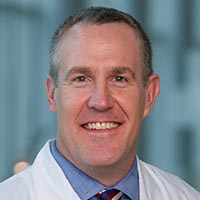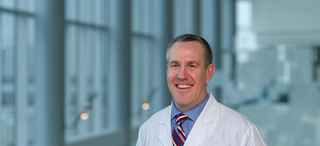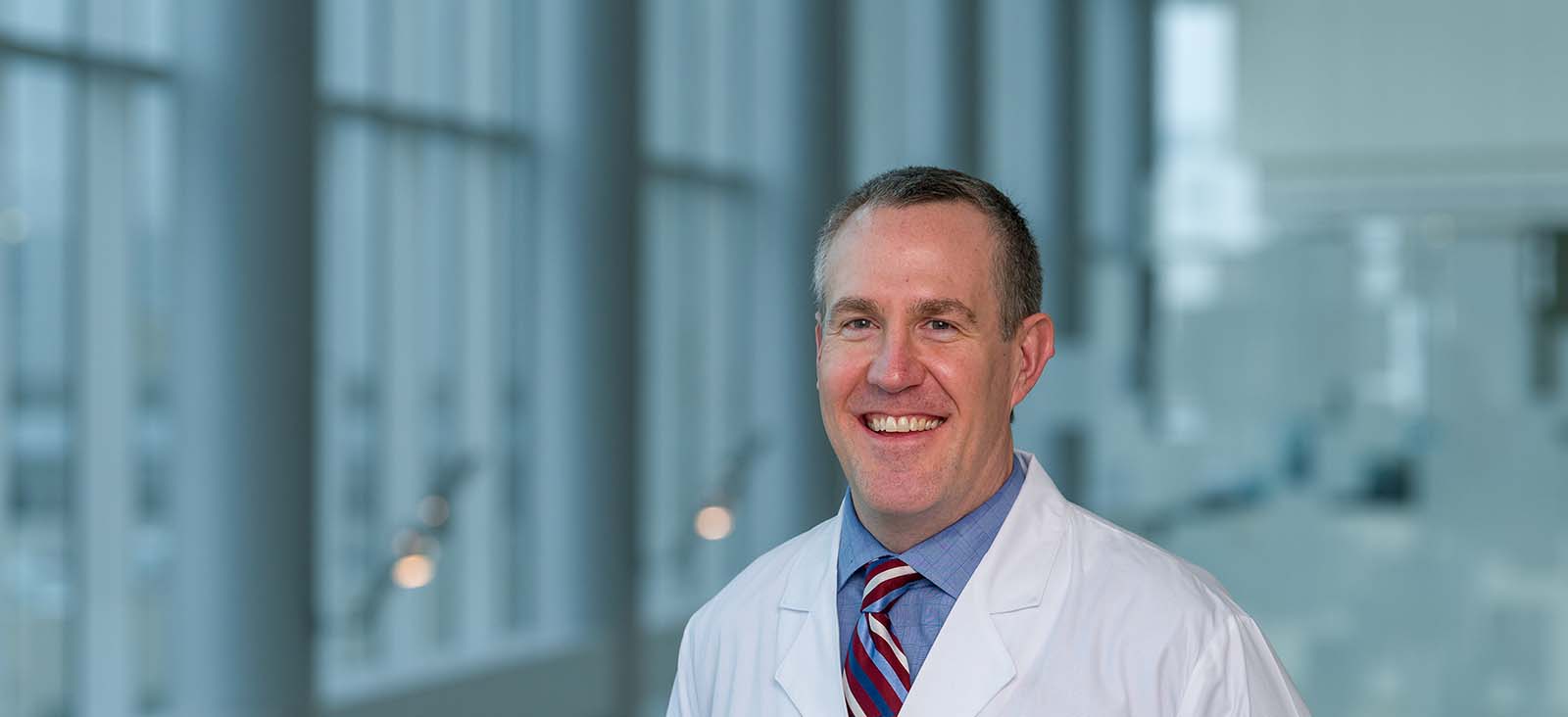- Clinical Immunology Society
- American Academy of Allergy, Asthma and Immunology

Christian Wysocki, M.D., Ph.D.
- Internal Medicine - Allergy and Immunology
- Primary immunodeficiency
- Immune dysregulation
New Patient Appointment Accepting Virtual Visits or 214-645-6616
Biography
Christian A. Wysocki, M.D., Ph.D., is an Associate Professor in the Departments of Internal Medicine and Pediatrics at UT Southwestern Medical Center. A specialist in allergy and immunology, he has also, since 2018, been the Clinical Director of the Primary Immunodeficiency Program in the Division of Allergy and Immunology at UT Southwestern and Children’s Health. The program is a Jeffrey Modell Foundation Diagnostic and Research Center.
Dr. Wysocki earned his medical degree and doctoral degree in microbiology and immunology at the University of North Carolina at Chapel Hill School of Medicine. He completed a residency in internal medicine at Yale University, where he also received advanced training through a fellowship in allergy and clinical immunology, with additional focused training in clinical immunology and primary immunodeficiency through the Clinical Immunology Society Summer School and USIDNET Visiting Immunology Scholars Program.
Certified by the American Board of Internal Medicine and the American Board of Allergy and Immunology, he joined the UT Southwestern faculty in 2013.
Dr. Wysocki is a member of the American Academy of Allergy, Asthma, and Immunology and the Clinical Immunology Society. In addition, he serves as an immunologist consultant for the newborn screen lab for severe combined immunodeficiency (SCID) for the Texas Department of State Health Services.
The Primary Immunodeficiency Program is a comprehensive clinical program dedicated to the diagnosis and multidisciplinary care of pediatric (and adult) patients with primary immunodeficiency disorders. The clinic offers multidisciplinary care to patients with these complex disorders.
As Clinical Director of the program, Dr. Wysocki oversees the close collaboration of a number of disciplines, including bone marrow transplant, gastroenterology, rheumatology, hematology/oncology, infectious diseases, and basic immunology and translational research scientists.
He additionally sees adult immunocompromised patients at UT Southwestern and Parkland Memorial Hospital, allowing for the seamless transition of patients with good continuity of care.
His ongoing research initiatives include a program directed at discovery of new genetic abnormalities causing immunodeficiency or other immunologic disorders, which for Dr. Wysocki represents a longstanding collaboration with Nicolai Van Oers, Ph.D., in the Department of Immunology. He also works in concert with Dr. Van Oers on projects focused on the development of the thymus (a crucial organ in the development of the immune system) and genetic disorders that impact this process.
Other interests include collaborative projects focused on hemophagocytic lymphohistiocytosis (HLH) in both pediatric and adult patients, as well as projects focused on the autoimmune and inflammatory complications of common variable immunodeficiency (CVID).
Dr. Wysocki has been a D Magazine Best Doctor for multiple years.
Education & Training
- Residency - Yale University School of Medicine (2008-2010), Internal Medicine
- Fellowship - Yale University School of Medicine (2010-2013), Allergy & Immunology
- Medical School - University of North Carolina at Chapel Hill (1999-2007)
- Internship - Yale New Haven Hospital (2007-2010), Internal Medicine
Professional Associations & Affiliations
Honors & Awards
- D Magazine Best Doctor, 2016, 2019 – 2025
- Director, Jeffrey Modell Diagnostic and Research Center 2018, Jeffrey Modell Foundation
- Expert Immunologist 2017, Jeffrey Modell Foundation
Books & Publications
-
Books
-
Antigen Presentation and Antigen Presenting Cells in Graft-Versus-Host Disease in Immune Biology of Allogeneic Hematopoietic Stem Cell Transplantation
Christian A. Wysocki and Warren D. Shlomchik (in press), Oxford, UK, Elsevier, Inc.
-
Antigen Presentation and Antigen Presenting Cells in Graft-Versus-Host Disease in Immune Biology of Allogeneic Hematopoietic Stem Cell Transplantation
-
Publications
-
Macrophage Activation Syndrome Complicated by Toxic Epidermal Necrolysis Following SARS-CoV-2 mRNA Vaccination.
Franzblau LE, Mauskar M, Wysocki CA, Journal of clinical immunology 2023 Apr 43 3 521-524 -
Epigenetic and Immunological Indicators of IPEX Disease in subjects with FOXP3 gene mutation.
Narula M, Lakshmanan U, Borna S, Schulze JJ, Holmes TH, Harre N, Kirkey M, Ramachandran A, Tagi VM, Barzaghi F, Grunebaum E, Upton JEM, Hong-Diep Kim V, Wysocki C, Dimitriades VR, Weinberg K, Weinacht KG, Gernez Y, Sathi BK, Schelotto M, Johnson M, Olek S, Sachsenmaier C, Roncarolo MG, Bacchetta R, The Journal of allergy and clinical immunology 2022 Sep -
Mesenchymal cell replacement corrects thymus hypoplasia in murine models of 22q11.2 deletion syndrome.
Bhalla P, Du Q, Kumar A, Xing C, Moses A, Dozmorov I, Wysocki CA, Cleaver OB, Pirolli TJ, Markert ML, de la Morena MT, Baldini A, van Oers NS, The Journal of clinical investigation 2022 Sep -
The mammalian SKIV2L RNA exosome is essential for early B cell development.
Yang K, Han J, Gill JG, Park JY, Sathe MN, Gattineni J, Wright T, Wysocki C, de la Morena MT, Yan N, Science immunology 2022 Jun 7 72 eabn2888 -
Obstructive hydrocephalus and intracerebral mass secondary to Epicoccumnigrum.
Charron TL, Gill MA, Filkins LM, Rajaram V, Wysocki CA, Whittemore BA, Medical mycology case reports 2022 Mar 35 18-21 -
Cytoplasmic RNA quality control failure engages mTORC1-mediated autoinflammatory disease.
Yang K, Han J, Asada M, Gill JG, Park JY, Sathe MN, Gattineni J, Wright T, Wysocki CA, de la Morena MT, Garza LA, Yan N, The Journal of clinical investigation 2022 Jan 132 2 -
Chronic Granulomatous Disease of the Upper Airway.
Bradshaw B, Jaffal H, Wysocki CA, Grover LA, Mitchell RB, Ulualp S, Shah GB, Chorney SR, Ear, nose, & throat journal 2021 Oct 1455613211054635 -
Lymphomatoid granulomatosis of the central nervous system (CNS-LYG) posing a management challenge.
Soleja M, Jaso JM, Chen W, Raisanen J, Wysocki CA, Shen YM, Mickey B, Kumar KA, Ramakrishnan Geethakumari P, Clinical case reports 2021 Sep 9 9 e04808 -
SARS-CoV-2 infection associated with hepatitis in an infant with X-linked severe combined immunodeficiency.
van Oers NSC, Hanners NW, Sue P, Aquino V, Li QZ, Schoggins JW, Wysocki CA, Clinical immunology (Orlando, Fla.) 2021 Jan 108662 -
A late preterm infant with lymphopenia.
Lutfeali S, Khan DA, Wysocki C, Allergy and asthma proceedings 2020 Mar 41 2 141-143 -
Molecular Insights Into the Causes of Human Thymic Hypoplasia With Animal Models.
Bhalla P, Wysocki CA, van Oers NSC, Frontiers in immunology 2020 11 830 -
FOXN1 compound heterozygous mutations cause selective thymic hypoplasia in humans.
Du Q, Huynh LK, Coskun F, Molina E, King MA, Raj P, Khan S, Dozmorov I, Seroogy CM, Wysocki CA, Padron GT, Yates TR, Markert ML, de la Morena MT, van Oers NS, The Journal of clinical investigation 2019 Sep -
In vivo dynamics of T cells and their interactions with dendritic cells in mouse cutaneous graft-versus-host disease.
Morin-Zorman S, Wysocki C, Zhu J, Li H, Zorman S, Matte-Martone C, Kisanga E, McNiff J, Jain D, Gonzalez D, Rothstein DM, Lakkis FG, Haberman A, Shlomchik WD, Blood advances 2019 07 3 14 2082-2092 -
Refractory macrophage activation syndrome in the setting of adult-onset Still disease with hemophagocytic lymphohistiocytosis detected on skin biopsy treated with canakinumab and tacrolimus.
Chamseddin B, Marks E, Dominguez A, Wysocki C, Vandergriff T, Journal of cutaneous pathology 2019 Jul 46 7 528-531 -
Connecting the Dots From Fever of Unknown Origin to Myelodysplastic Syndrome: GATA2 Haploinsufficiency.
Montiel-Esparza R, Reys B, Rogers ZR, Evans AS, Wysocki CA, Timmons C, Dickerson KE, Journal of pediatric hematology/oncology 2019 Apr -
What's in a name? The heterogeneous clinical spectrum and prognostic factors in a cohort of adults with hemophagocytic lymphohistiocytosis.
Prokesch BC, Nagalla S, Ezzati F, Tujios SR, Dominguez A, Chen W, Kershaw C, Patel P, de la Flor C, Foster J, Martin AA, de la Morena MT, Wysocki CA Transfusion and apheresis science : official journal of the World Apheresis Association : official journal of the European Society for Haemapheresis 2018 Oct -
Novel nonsense gain-of-function NFKB2 mutations associated with a combined immunodeficiency phenotype.
Kuehn HS, Niemela JE, Sreedhara K, Stoddard JL, Grossman J, Wysocki CA, de la Morena MT, Garofalo M, Inlora J, Snyder MP, Lewis DB, Stratakis CA, Fleisher TA, Rosenzweig SD Blood 2017 08 -
Long term outcomes of 176 patients with X-linked hyper IgM syndrome treated with or without hematopoietic cell transplantation.
de la Morena MT, Leonard D, Torgerson TR, Cabral-Marques O, Slatter M, Aghamohammadi A, Chandra S, Murguia-Favela L, Bonilla F, Kanariou M, Damrongwatanasuk R, Kuo CY, Dvorak CC, Meyts I, Chen K, Kobrynski L, Kapoor N, Richter D, DiGiovanni D, Dhalla F, Farmaki E, Speckmann C, Espanol T, Shcherbina A, Hanson C, Litzman J, Routes J, Wong M, Fuleihan R, Seneviratne SL, Small TN, Janda A, Bezrodnik L, Seger R, Raccio AG, Edgar JD, Chou J, Abbott JK, van Montfrans J, Gonzalez-Granado LI, Bunin N, Kutukculer N, Gray P, Seminario G, Pasic S, Aquino V, Wysocki C, Abolhassani H, Grunebaum E, Dorsey M, Costa Carvalho BT, Condino-Neto A, Cunningham-Rundles C, Knutsen AP, Sleasman J, Chapel H, Ochs HD, Filipovich A, Cowan M, Gennery A, Cant A, Notarangelo LD, Roifman C The Journal of allergy and clinical immunology 2016 Sep -
Hypomorphic Janus kinase 3 mutations result in a spectrum of immune defects, including partial maternal T-cell engraftment.
Cattaneo F, Recher M, Masneri S, Baxi SN, Fiorini C, Antonelli F, Wysocki CA, Calderon JG, Eibel H, Smith AR, Bonilla FA, Tsitsikov E, Giliani S, Notarangelo LD, Pai SY The Journal of allergy and clinical immunology 2013 Apr 131 4 1136-45 -
Critical role for CCR5 in the function of donor CD4+CD25+ regulatory T cells during acute graft-versus-host disease.
Wysocki CA, Jiang Q, Panoskaltsis-Mortari A, Taylor PA, McKinnon KP, Su L, Blazar BR, Serody JS Blood 2005 Nov 106 9 3300-7 -
Leukocyte migration and graft-versus-host disease.
Wysocki CA, Panoskaltsis-Mortari A, Blazar BR, Serody JS Blood 2005 Jun 105 11 4191-9 -
Differential roles for CCR5 expression on donor T cells during graft-versus-host disease based on pretransplant conditioning.
Wysocki CA, Burkett SB, Panoskaltsis-Mortari A, Kirby SL, Luster AD, McKinnon K, Blazar BR, Serody JS Journal of immunology (Baltimore, Md. : 1950) 2004 Jul 173 2 845-54 -
Inhibition of acute graft-versus-host disease with retention of graft-versus-tumor effects by the proteasome inhibitor bortezomib.
Sun K, Welniak LA, Panoskaltsis-Mortari A, O'Shaughnessy MJ, Liu H, Barao I, Riordan W, Sitcheran R, Wysocki C, Serody JS, Blazar BR, Sayers TJ, Murphy WJ Proceedings of the National Academy of Sciences of the United States of America 2004 May 101 21 8120-5 -
Development of amphotropic murine retrovirus vectors resistant to inactivation by human serum.
Pensiero MN, Wysocki CA, Nader K, Kikuchi GE Human gene therapy 1996 Jun 7 9 1095-101
-
Macrophage Activation Syndrome Complicated by Toxic Epidermal Necrolysis Following SARS-CoV-2 mRNA Vaccination.
Research
- Primary immunodeficiency
- Immune dysregulation
- Transplant immunology
- Autoinflammatory disorders
- Hemophagocytic lymphohistiocytosis
Clinical Focus
- Primary immunodeficiency
- Immune dysregulation
- Autoinflammatory disorders
- DiGeorge syndrome/22q11.2 deletion syndrome
- Hemophagocytic lymphohistiocytosis (HLH)
Results: 2 Locations
Allergy, Immunology, and Pulmonary Clinic
at Professional Office Building 2 5939 Harry Hines Blvd., 9th FloorDallas, Texas 75390 214-645-6616 Directions to Allergy, Immunology, and Pulmonary Clinic at Professional Office Building 2, Dallas Parking Info for Allergy, Immunology, and Pulmonary Clinic
Children's Medical Center of Dallas
1935 Medical District DriveDallas, Texas 75235 214-730-5437 Directions to Children's Medical Center of Dallas at Children's Medical Center of Dallas, Dallas
New Patient Appointment Accepting Virtual Visits or 214-645-6616

